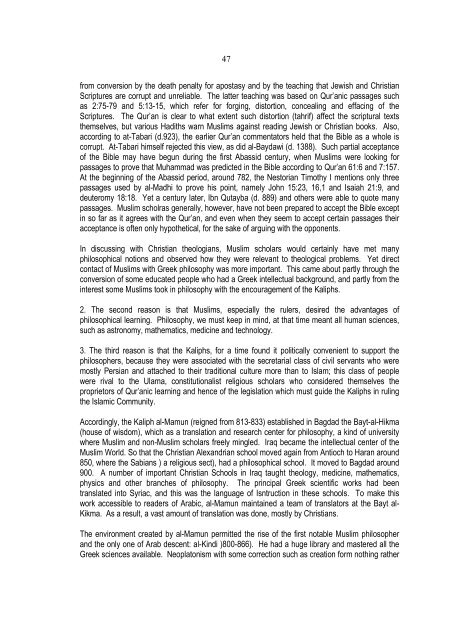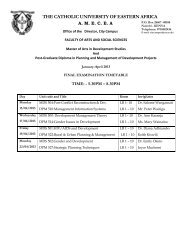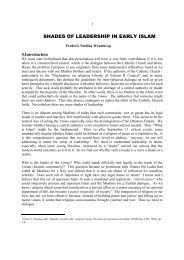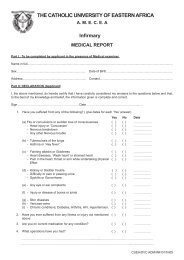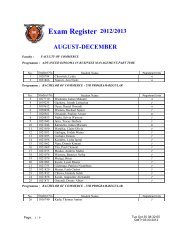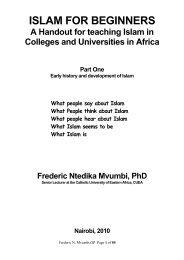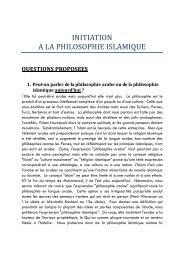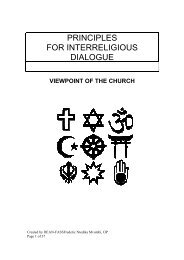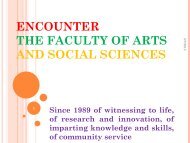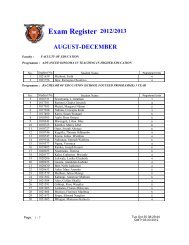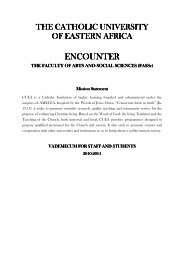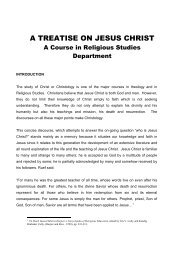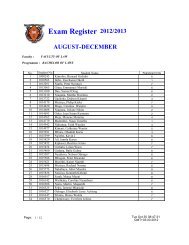INTRODUCTION TO ISLAMIC THEOLOGY.pdf - CUEA
INTRODUCTION TO ISLAMIC THEOLOGY.pdf - CUEA
INTRODUCTION TO ISLAMIC THEOLOGY.pdf - CUEA
You also want an ePaper? Increase the reach of your titles
YUMPU automatically turns print PDFs into web optimized ePapers that Google loves.
47from conversion by the death penalty for apostasy and by the teaching that Jewish and ChristianScriptures are corrupt and unreliable. The latter teaching was based on Qur’anic passages suchas 2:75-79 and 5:13-15, which refer for forging, distortion, concealing and effacing of theScriptures. The Qur’an is clear to what extent such distortion (tahrif) affect the scriptural textsthemselves, but various Hadiths warn Muslims against reading Jewish or Christian books. Also,according to at-Tabari (d.923), the earlier Qur’an commentators held that the Bible as a whole iscorrupt. At-Tabari himself rejected this view, as did al-Baydawi (d. 1388). Such partial acceptanceof the Bible may have begun during the first Abassid century, when Muslims were looking forpassages to prove that Muhammad was predicted in the Bible according to Qur’an 61:6 and 7:157.At the beginning of the Abassid period, around 782, the Nestorian Timothy I mentions only threepassages used by al-Madhi to prove his point, namely John 15:23, 16,1 and Isaiah 21:9, anddeuteromy 18:18. Yet a century later, Ibn Qutayba (d. 889) and others were able to quote manypassages. Muslim scholras generally, however, have not been prepared to accept the Bible exceptin so far as it agrees with the Qur’an, and even when they seem to accept certain passages theiracceptance is often only hypothetical, for the sake of arguing with the opponents.In discussing with Christian theologians, Muslim scholars would certainly have met manyphilosophical notions and observed how they were relevant to theological problems. Yet directcontact of Muslims with Greek philosophy was more important. This came about partly through theconversion of some educated people who had a Greek intellectual background, and partly from theinterest some Muslims took in philosophy with the encouragement of the Kaliphs.2. The second reason is that Muslims, especially the rulers, desired the advantages ofphilosophical learning. Philosophy, we must keep in mind, at that time meant all human sciences,such as astronomy, mathematics, medicine and technology.3. The third reason is that the Kaliphs, for a time found it politically convenient to support thephilosophers, because they were associated with the secretarial class of civil servants who weremostly Persian and attached to their traditional culture more than to Islam; this class of peoplewere rival to the Ulama, constitutionalist religious scholars who considered themselves theproprietors of Qur’anic learning and hence of the legislation which must guide the Kaliphs in rulingthe Islamic Community.Accordingly, the Kaliph al-Mamun (reigned from 813-833) established in Bagdad the Bayt-al-Hikma(house of wisdom), which as a translation and research center for philosophy, a kind of universitywhere Muslim and non-Muslim scholars freely mingled. Iraq became the intellectual center of theMuslim World. So that the Christian Alexandrian school moved again from Antioch to Haran around850, where the Sabians ) a religious sect), had a philosophical school. It moved to Bagdad around900. A number of important Christian Schools in Iraq taught theology, medicine, mathematics,physics and other branches of philosophy. The principal Greek scientific works had beentranslated into Syriac, and this was the language of Isntruction in these schools. To make thiswork accessible to readers of Arabic, al-Mamun maintained a team of translators at the Bayt al-Kikma. As a result, a vast amount of translation was done, mostly by Christians.The environment created by al-Mamun permitted the rise of the first notable Muslim philosopherand the only one of Arab descent: al-Kindi )800-866). He had a huge library and mastered all theGreek sciences available. Neoplatonism with some correction such as creation form nothing rather


